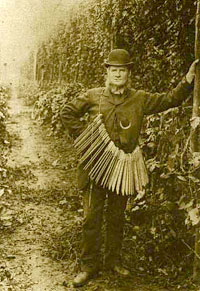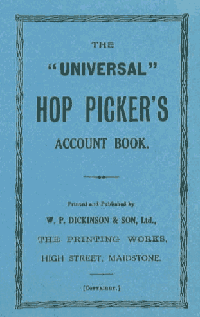How were the pickers paid?
Video clips © BBC
Pickers were paid according to how many hops they picked.
Do you think it was a fair way to pay people? Why?
Every day the family's hops would be put into a bin. The measurer would come along and empty the bins using a basket called a bushel. The tallyman would record how many bushels each family had picked. The family would be paid at the end of the hop-picking season but could take an advance on their wages if they needed it (this was called 'subs').
Read this extract from 'The collected Essays, Journalism and Letters of George Orwell':
2 to 19 September 1931
Two or three times a day the hops are measured and you are due a certain sum (in our case twopence) for each bushel you have picked. A good vine yields about half a bushel of hops, and a good picker can strip a vine in about ten minutes, so that theoretically one might earn about 30s by a sixty-hour week. But in practice this is quite impossible. To begin with, the hops vary enormously. On some vines they are as large as small pears, and on others hardly bigger than peas; the bad vines take rather longer to strip than the good ones - they are generally more tangled - and sometimes it needs five or six of them to make a bushel. The there are all kinds of delays, and the pickers get no compensation for lost time. Sometimes it rains (if it rains hard the hops get too slippery to pick) and one is kept waiting when changing from field to field, so that an hour or two is wasted every day. And above all there is the question of measurement. Hops are soft things like sponges, and it is easy for the measurer to crush a bushel of them into a quart if he chooses. Some days he merely scoops the hops out, but on other days he has orders from the farmer to "take them heavy", and then he crams them tight into the basket, so that instead of getting 20 bushels for a full bin one gets only twelve or fourteen, i.e. a shilling or so less...
On adding up our tally book, Ginger and I found that we had made just 26s each by eighteen days' work. We had drawn 8s each in advances (or "subs" as they are called), and we had made another 6s between us by selling stolen apples. After paying our fares we got to London with about 16s each. So we had, after all, kept ourselves while we were in Kent and come back with a little in our pockets; but we had only done it by living on the very minimum of everything.
Does the writer think he has been fairly paid? Do you think he enjoyed hop picking? What does he think the problems are with the payment system?

A tally man
Read this extract from the Hop-pickers rules, which were printed in the Universal Hop measurers' Account Book:
Pickers
All pickers to pick the hops well and to their employer's satisfaction, and to be subject to the regulations herein set forth and after the tally has been set they shall remain until the picking is all finished. To pick hops clean from strings and poles and free from bunches and leaves. To be in the hop garden and remain there at the appointed hours.
For every breach of these regulations to forfeit one bushel of hops. Any pickers who shall leave before the picking is finished, or shall be discharged for conduct not in accordance with the foregoing Regulations, or for other misconduct, shall be paid off at a rate of one shilling for every twelve bushels.
The tally shall be set in the first week of picking... Pickers may draw on account... not exceeding one half their earnings...
What are the rules? Do you think they sound fair? Why do you think the tally (the amount the pickers are paid for each bushel) needs to be changed and set each year? Can the pickers get an advance on their wages?
This is a real hop picking account book. Click here to print it out and try to fill it in as if you were the bookkeeper.


 Previous Page
Previous Page